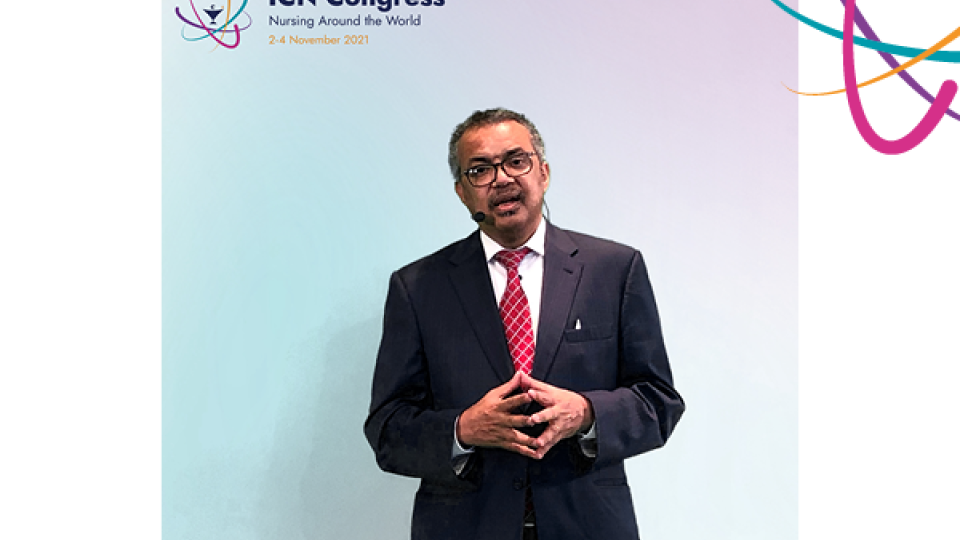World Health Organization and International Labour Organization leaders call for investment and decent work for nurses

The International Council of Nurses (ICN) today welcomed the Director Generals of two of the world’s most important international organisations. Dr Tedros Adhanom Ghebreyesus, Director General of the World Health Organization and Guy Ryder, Director General of the international Labour Organization, were the final plenary speakers at the three-day ICN virtual Congress which closes today. Both leaders expressed their unconditional support for nurses and investment in the nursing profession.
Dr Tedros said:
‘We have a moral obligation to protect all health and care workers, ensure their rights and provide them with decent work in a safe and enabling environment. This includes access to vaccines. As we recover and rebuild, investments in emergency preparedness and response must prioritise the education and employment of health and care workers, including nurses.
“In this Year of the Health and Care Worker, the pandemic has reminded all of us how much we all depend on nurses, from our first days to our last, and why all countries must invest in nurses now and for the future.
‘WHO is committed to supporting countries to give nurses the jobs, education, leadership opportunities and safe and decent working conditions they deserve. We will keep working for a world where all countries have a strong health and care workforce as the backbone of a strong health system, as part of its journey towards universal health coverage.
‘The partnership and support of ICN and national nursing associations is essential for achieving these goals, and for building a healthier, safer, and fairer world for all.”
Dr Tedros also answered questions from five frontline nurses in Canada, the Philippines, Estonia, Ghana and Pakistan on a variety of issues.
In response to a question, he confirmed his commitment to continue to collect up to date information on the nursing workforce. He expressed his concern about the impact of the COVID-19 pandemic on the retention of nurses and stated that we needed to ensure governments both committed to and delivered on investing in nursing. He also acknowledged the importance of independent expertise to support the reporting and analysis.
Dr Tedros also spoke about the need for countries to commit to investing in health saying:
“We need to push together, the WHO, ICN and other stakeholders not only to train and hire more nurses, but to have a good working environment, starting with protection to pay, and the rest.”
Finally, he spoke about the WHO Global Code of Practice on the International Recruitment of Health Personnel and the importance of Member States understanding the impact, and achieving the right balance.
The ILO’s Guy Ryder spoke of the long history of collaboration between the ILO and ICN. More than 40 years ago, the ILO adopted the Nursing Personnel Convention; Convention number 149. It remains the only international legal instrument dedicated to the nursing profession.

Mr Ryder expressed his admiration for nurses, saying:
“Nurses made tremendous sacrifices during the pandemic – as, of course, did other workers. Many fell sick. Far too many paid the ultimate price. By May this year, at least 115,000 health and care workers had died due to COVID-19.
‘Nurses also took on an enormous extra workload. This led to long working hours, sometimes in poor working conditions, with inadequate rest; a lack of personal protective equipment; and even – and this is particularly shocking - violence and harassment. At the same time, many nurses were coping with increased domestic responsibilities, and living with the fear of bringing the disease back home to their family and friends.”
Earlier this year, the ILO’s 187 Member States unanimously adopted a ‘Global call to action for a human-centred recovery from the COVID-19 crisis’ which calls for health-care workers and other front-line workers to have access to vaccines, personal protective equipment, training, testing and psychosocial support. It also calls for adequate remuneration and protection at work, specifically against excessive workloads.
Mr Ryder said that investment in the nursing profession was important, but he added that:
“…even this investment alone is not enough. It needs to go hand-in-hand with measures to combat a wider range of decent work deficits. Otherwise, nurses will continue to leave, and other people, particularly youth, will not replace them.
‘There is only one way to create a strong and sustainable recovery from this crisis. That is by taking a human-centred approach. One that integrates human and labour rights into policies and actions. One that supports both businesses and working people. Building resilience into our health systems means investing in the training, pay and conditions of health and care workers. It means respecting their fundamental rights at work. The ILO is proud to stand with you, to strengthen and support the right of nurses to decent work. “
The ICN Congress brought together over 5,500 participants from 132 countries to hear a vast array of presentations from expert speakers on a wide variety of topics of interest to nursing and health. The Congress is held every two years.
To register for six months’ access to recordings of the plenary sessions and the rest of the ICN Congress go to: https://congress2021.icnevents.online/.
Download the communique here